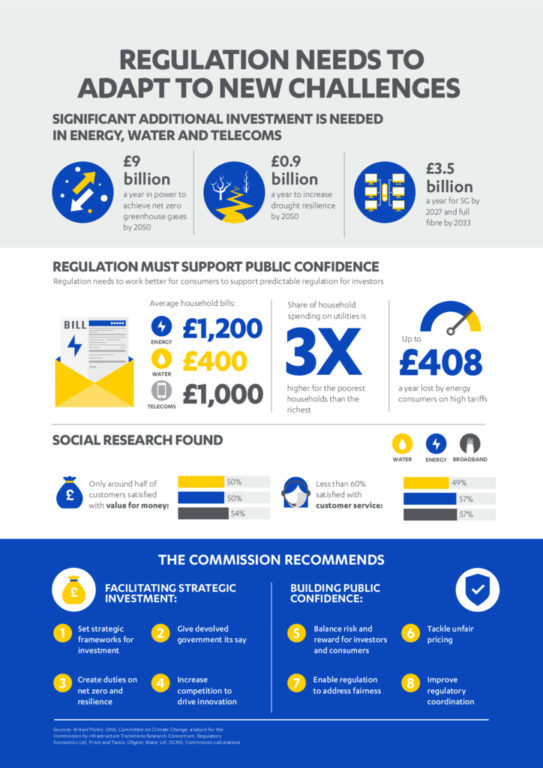Regulation
Status:Final report complete.
Exploring how the UK’s regulatory system must adapt to meet the demands of the future and secure the strategic investment needed.
Summary
In October 2018, the government asked the Commission to conduct a new study into regulation of the UK’s energy, telecoms and water industries.
The Commission’s study examined what future changes will affect the regulated sectors, and how to ensure the necessary levels of investment and innovation while keeping critical services affordable for everyone.
The study explored regulatory consistency and how government and regulators work together. It considered the full range of potential implications of changes, paying particular attention to the need to keep bills affordable and to ensure vulnerable customers are protected.
A call for evidence supported the study, submissions for which were open until April 2019.
The study’s final report, Strategic investment and public confidence, found that the UK’s model of regulation for energy, water and telecoms has generated significant investment over the past decades, but that the system is increasingly facing new challenges that it was not designed to address. It sets out how regulators, industry and government must adapt to face the coming challenges of achieving net zero, adapting to changing weather patterns, and increasing digitalisation.
Next Section: Facts & Figures
This infographic summarises how the UK's regulatory system needs to adapt to meet future needs.
Facts & Figures
This infographic summarises how the UK's regulatory system needs to adapt to meet future needs.
Next Section: Recommendations
The report made eight recommendations to strengthen and update the regulatory framework for economic infrastructure, and to improve public and political confidence in it.
Recommendations
The report made eight recommendations to strengthen and update the regulatory framework for economic infrastructure, and to improve public and political confidence in it.
A clearer strategic framework for the long term investment needs of the country
Forward looking regulation, by independent regulators, remains the best approach to balancing the needs of consumers and investors, whilst incentivising efficiency. However, this should be embedded in a clearer strategic framework for the long term investment needs of the country:
- The government should introduce legislation by 2021 to fulfil its previous proposal that regulators have regard to endorsed recommendations from the Commission
- The government should set out a long term strategic vision for each of the regulated sectors, through strategic policy statements, within the first year of each Parliament, to support lasting plans and stable funding.
Regulatory frameworks should reflect the devolution of powers within the UK
Regulatory frameworks should reflect the devolution of powers within the UK:
- Ahead of the next price controls, regulators should put in place formal mechanisms, such as advisory committees, to ensure they have regard to the strategic vision set out by devolved administrations, where devolved and reserved powers interact
- In future price controls, regulators should demonstrate how they have taken consideration of the strategic vision of metro mayors and relevant local government, within devolved powers, where this has material impacts for network investment
- Regardless of specific devolved powers, regulators should engage with the views of elected representatives, alongside other sources of insight into consumers and the public’s preferences.
Updating regulators’ duties
Regulators’ duties need to be coherent, covering price, quality, resilience and environment. Government should introduce legislation by 2021 ensuring that, where they are currently missing, Ofwat, Ofgem and Ofcom have duties to require them to seek to:
- Ensure their decisions promote the resilience of infrastructure systems
- Ensure their decisions are consistent with, and promote the achievement of, the government’s legislated greenhouse gas emissions targets, currently achieving net zero greenhouse gases by 2050
- Collaborate with other regulators, where relevant, to avoid contradictory regulation and promote efficient outcomes for consumers on cross-sectoral issues.
Using competition to support innovation
The use of competition should be enhanced as the most reliable means of supporting innovation, particularly where there is rapid technological change:
- Regulators should focus ‘standard’ periodic price controls on the maintenance of existing networks and marginal enhancements
- Ofcom should continue to promote infrastructure competition for fibre and mobile networks
- Government should introduce legislation, ahead of the next price controls, to remove any barriers to the use of competition in the provision of strategic enhancements to water and energy networks
- For future price controls, Ofwat and Ofgem should separate consideration of strategic enhancements from the ‘standard’ periodic price control. Ofwat and Ofgem should develop tendering processes for strategic enhancements, with a clear, public justification required where tendering is not used
- Government should ensure that regulators have the resources they need to carry out competitive tenders for transformational investments.
Regulators should address financial risk and corporate governance issues
Regulators should be more proactive in addressing financial risk and corporate governance, to ensure that rewards reflect performance and risks that are genuinely taken by investors:
- In future price controls, regulators should take direct account of information asymmetries in assessing the weighted average cost of capital and total expenditure allowances, ‘aiming off’ to ensure a fair outcome for consumers and investors
- In future price controls, regulators should introduce outperformance sharing mechanisms to allow consumers to share in the benefits that equity investors achieve from high gearing, where companies have gearing levels which significantly exceed the level assumed by the regulators
- For natural monopoly companies, regulators should evaluate the case for an absolute cap on gearing
- For firms with a natural monopoly, regulators should ensure executive salaries are demonstrably linked to long-term performance for consumers and the public.
Prevent companies from engaging in price discrimination that does not provide an overall benefit to consumers
Regulators should be able to prevent companies from engaging in price discrimination that does not provide an overall benefit to consumers:
- Regulators should require companies to report annually on which groups of customers are paying more for the same service; companies should be required to publicly justify their price discrimination policies or rectify them
- Regulators should be able to require companies to change their price structures where price discrimination cannot be justified by benefits to consumers
- Government should introduce legislation, by 2021, to replace the current court-based enforcement of consumer law with an administrative compliance and enforcement model, subject to appropriate scrutiny by the courts.
Closer attention to distributional consequences for customers
Government and regulators cannot rely on a flawed assumption that market design and distributional consequences can be separated. For future regulatory proposals with significant distributional consequences:
- Regulators should publish an analysis of the distributional consequences for consumers and businesses of their proposals, and of the impact of possible mitigations for significant adverse effects
- Regulators’ boards should be given the power, by 2021, to seek explicit guidance from ministers on strategic policy direction and distributional choices, against a menu of feasible options provided by the regulator and within a fixed three-month period
A stronger role for the UK Regulators Network
The UK Regulators Network should have a stronger role, supported by an independent chair:
- By the end of 2020, the UK Regulators Network should appoint an independent chair
- By the end of 2020, the government should review data sharing powers by regulators to ensure they can develop a ‘whole customer view’
- By the end of 2021, regulators, with the support of the UK Regulators Network, should develop joint data sets to enable whole customer analysis
- By July 2021, the independent chair of the UK Regulators Network should publish a business plan setting out how the network will support collaboration on the achievement of common goals; coordination to avoid contradictory regulation and inefficiency; data and knowledge sharing, including supporting the regulators to improve their data management capability; improved performance reporting by regulators.
Terms of reference
The aim of this study is to assess what changes might be necessary to the existing regulatory framework to facilitate future investment needs, promote greater competition and increase innovation, and meet the needs of both current and future consumers. The scope of the study is the key regulated infrastructure sectors: telecoms, energy, water.
The economic regulatory framework is central to the provision of infrastructure, with Ofcom, Ofgem, Ofwat monitoring and refereeing how infrastructure is funded, delivered and operated within their respective sectors.
This study will consider how the regulatory system can adapt to meet future challenges. The key issues it should address are:
1. What the future changes are that will affect the regulated sectors – The National Infrastructure Assessment identified the UK’s infrastructure needs to 2050. The study should set out the key drivers of change in the coming decades, and consider:
a) The relative impact and importance of these changes, and the impact on investment needs
b) How these changes are likely to affect the functions and scope of regulators
c) The ways in which regulation might need to adapt over the coming years in light of these challenges
2. Competition and innovation – Has the regulatory model facilitated enough competition and innovation to support investment, efficient delivery of infrastructure and the interests of consumers? How can regulators be more “adaptive” to respond to and encourage innovation? The study should consider:
a) Evidence on the ability of regulators to promote high performance from utility companies and discourage underperformance
b) Evidence on levels of competition and new entrants in different sectors
c) Evidence on the role of competition and innovation in driving positive outcomes for consumers
d) Current barriers to regulatory adaptability; how to improve the speed at which regulation responds to change, and the role of data in supporting this
e) Mechanisms for encouraging innovation and competition within regulators and industry, and those that allow regulation to be more adaptive to deal with new technologies.
3. Regulatory consistency – Drawing upon international examples and best practice where relevant, the study should consider how the regulatory framework can facilitate collaboration on cross-cutting projects and challenges and protect the interests of consumers, including:
a) Whether existing regulatory, legislation, licencing and governance structures effectively promote collaboration, efficiency, regulatory consistency and scrutiny
b) Whether consistency has an impact on the delivery of significant infrastructure projects which involve multiple utility sectors
c) Whether regulators have worked together adequately on cross-cutting issues, and how this can be improved
d) The similarities and differences in the legislation underpinning the regulators, how this affects their approach, and how this might evolve after EU exit.
4. How government and regulators work together – How Government is able to effectively deliver its priorities for the regulated sectors, whilst continuing to safeguard regulatory independence. The study should consider:
a) What the relationship is between Government setting policy and strategic direction and regulators’ approach to their sectors
b) How this might be improved, to better deliver Government objectives, and support collaboration, whilst safeguarding the regulatory independence which is key to the model and essential for investors
In taking forward this work the Commission should work with HMT, BEIS, DEFRA, DCMS and other relevant government departments, the economic regulators and the UKRN, industry bodies and stakeholders, academics and institutions, and consumer groups. These departments will lead HMG’s engagement with the Commission in areas which concern regulators or bodies for which they are responsible.
The Commission should also have specific regard for outcomes for consumers when conducting its review and as part of this should take account of distributional issues, consumer disengagement and the scale and quality of consumer protections across the regulated sectors.
The Commission should ensure that its recommendations do not directly undermine the UK’s regulatory institutions or their existing work programmes, nor negatively affect how the government currently works with stakeholders across regulated industries.
Recommendations should be consistent with the government’s fiscal and economic remits, take into account the fiscal and consumer bill impacts in the National Infrastructure Assessment, and not have significant impact on the public balance sheet. Recommendations should also consider the full range of implications for regulated sectors, including the need to ensure bills are affordable and vulnerable consumers are protected.
Any recommendations impacting individual regulators, or their specific sectors, issued by the Commission are to be considered and Government’s collective response to be proposed by the Secretary of State of those regulators’ sponsoring departments.
The Commission should report on the regulation study in Autumn 2019.
Next Section: Supporting evidence
The study was supported by an open call for evidence and a number of expert papers and technical data:
Supporting evidence
The study was supported by an open call for evidence and a number of expert papers and technical data:
- Consultation responses to our call for evidence on the future of regulation
- Research by BritainThinks on public views of regulation and resilience
- A paper on Adaptive regulation, market risk and the cost of capital – Grout & Zalewska
- Technical annex: Performance data for water, energy and telecoms
- Technical annex: Duties diagrams for water, energy and telecoms – Centre for Competition Policy
Strategic investment and public confidence
The study’s final report suggests how the UK’s regulatory system must adapt to meet the demands of the future and secure the strategic investment needed in the energy, water and telecoms sectors to reduce emissions, improve digital connectivity and build resilience to floods and drought.

Latest Updates

Coming up in 2024
This page shows a calendar reflecting the latest expected dates for Commission reports, publications and events. You can also sign up to receive our quarterly newsletter by entering your email address in the box at the foot of each website page.

Commission welcomes net zero duty for Ofgem
The goverment has confirmed plans to amend the Energy Security Bill, currently before the House of Commons, to give the energy regulator Ofgem a new explicit net zero duty. The amendment will legally require the regulator to ensure its decisions assist the governmen’s drive to deliver zero greenhouse gas emissions by 2050 and boost investment...

Parliamentary Committee backs Commission’s plan for stronger infrastructure resilience
A Parliamentary Committee has called on government to act quickly on National Infrastructure Commission recommendations to improve the resilience of key infrastructure services, in a hard hitting critique of government’s current approach to ensuring security of key national infrastructure. In a report published today (27 October 2022), the Joint Committee on the National Security Strategy...

Commission calls for “real policy changes” on utilities regulation
The government has today (31 January 2022) published a policy paper in response to the Commission’s 2019 study on regulation, Strategic Investment and Public Confidence. This study highlighted that, whilst the current system of regulation had generated significant investment over the past decades, it was increasingly facing new challenges that it was not designed to...

Future of Regulation Study: call for evidence






